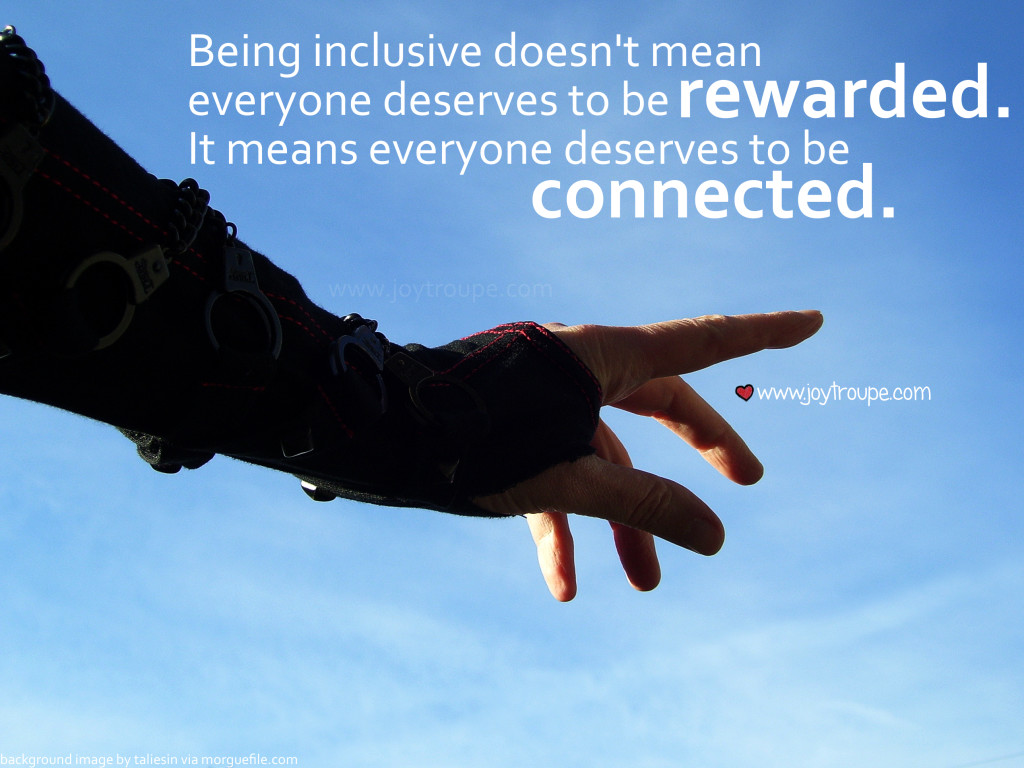Last week, the national news picked up a controversy stemming from something that happened at a Maryland school. Many of the responses I’ve seen to this story seem to be arguing that it shouldn’t be controversial. I agree that there shouldn’t be a controversy, but I have what seems to be a very unpopular opinion on where the consensus should lie on the subject. So, forgive me, but I’m going to wade into some water that’s a little deep here. If you’re not up for it, I understand. I’ll have a nice, light post for you soon. But if you can, please come with me on this for a while.
To give you a brief overview, a Montgomery County School excluded 1/3 of the student body from a social event that happened on school property during school hours. The source of funds for this event was not explicitly mentioned in any of the articles I could find, so we are left to assume that it was paid for with school or PTA funds. The typical response to articles about the subject, summarized, is “I don’t see the problem with rewarding kids for good grades. Life isn’t fair. The real world is competitive and we should stop sheltering kids from that by rewarding everyone equally.”
 I want to break that down. Let’s start with “life isn’t fair” and “people shouldn’t all be rewarded equally.” I am pretty sure most kids know that life isn’t fair. Although it is much “fair”er to white, neurotypical kids from middle and upper middle class homes. So we don’t need to teach them that life doesn’t treat them all equally. What we want to avoid teaching them is that injustice is cool, that the people who don’t like injustice are the outliers, and that the ones with advantages are more deserving of a seat at the table.
I want to break that down. Let’s start with “life isn’t fair” and “people shouldn’t all be rewarded equally.” I am pretty sure most kids know that life isn’t fair. Although it is much “fair”er to white, neurotypical kids from middle and upper middle class homes. So we don’t need to teach them that life doesn’t treat them all equally. What we want to avoid teaching them is that injustice is cool, that the people who don’t like injustice are the outliers, and that the ones with advantages are more deserving of a seat at the table.
Social inclusion shouldn’t be something we “award.” Inclusion is about building community and fostering connections between people. I agree that rewarding everyone equally regardless of how hard they work is just as ridiculous as only rewarding people for things they can’t control. That said, there is a very broad distinction to be made between recognizing the value of an achievement and recognizing the value of a person. In many many cases, I feel we as a society do a very bad job of making that distinction, and we allow it to carry over in our schools. To reduce this to “life isn’t fair” or “real life is competitive” is to stop talking about what it looks like to be inclusive and instead discuss something else altogether. Being inclusive doesn’t mean everyone deserves to be rewarded- it means everyone deserves to be connected.
In this case, the “reward” for achievement took the form of excluding 1/3 of the students from participating in a social activity sponsored by the school, during school. That crosses a line into selecting social standing, in my opinion. In How the Honor Roll Cheats Students and divides schools, Tommy Raskin says “School could be a haven of pure learning for children who, in the outside world, are on the bottom of social hierarchies. Instead, the school system chooses to reinforce hierarchical distinctions, pitting kids against each other, enabling some students to use outside resources (i.e., knowledgeable parents, secure homes, SAT review classes) to their decisive advantage. And, at the end of it all, these lucky few get their names posted in the front hallway to remind everyone that they’re society’s winners and that the non-included students are, well, implicitly, losers.”
If we want our children to develop “leadership skills” while they are in school, and if we are going to have school sponsored social events, then we have a responsibility to do so with an eye (and a heart) toward making sure that the subtext we are offering our children tells a story of justice. We need to challenge ourselves and our schools to do better at this. Our goal, as parents, should be to reward effort, citizenship, and excellence while recognizing that people have value that transcends their achievements. Raising good citizens means we need to teach our children to show kindness to those who are different than they- something they won’t learn if the “different” kids are excluded from their social sphere, even within the confines of the school day.
In many cases, academically oriented kids have historically been excluded socially. Changing who is “inside” and who is “outside” does nothing to address the underlying problems of placing value on “exclusivity” over connection. We need to find ways to reward achievement while simultaneously upholding solid ideals about who deserves a seat at the table. I’m not sure exactly how we do that. I only know that if we keep doing what we’ve always done, we’ll keep getting what we’ve always gotten. I would welcome your thoughts on how we can set inclusive examples for our kids.

